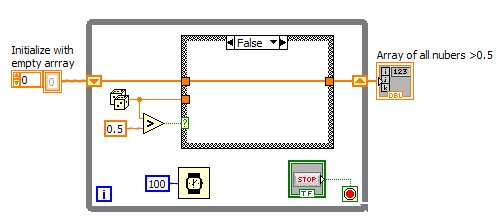- Subscribe to RSS Feed
- Mark Topic as New
- Mark Topic as Read
- Float this Topic for Current User
- Bookmark
- Subscribe
- Mute
- Printer Friendly Page
Can't build array without indexing?
04-26-2008 10:24 AM
- Mark as New
- Bookmark
- Subscribe
- Mute
- Subscribe to RSS Feed
- Permalink
- Report to a Moderator
I'm getting a bit frustrated here as I want to build a 1D array of values, the length of which is unknown, with each iteration of a case statement within a loop. It seems as though if you don't know the length of the array you want to build this can be impossible because you cannot "index" the array unless you exit the loop, which isn't an option. As I said, I don't know what length the array will be and I don't want to be inefficient and just initialize a very large array.
04-26-2008 10:36 AM
- Mark as New
- Bookmark
- Subscribe
- Mute
- Subscribe to RSS Feed
- Permalink
- Report to a Moderator
04-26-2008 10:45 AM - edited 04-26-2008 10:47 AM
- Mark as New
- Bookmark
- Subscribe
- Mute
- Subscribe to RSS Feed
- Permalink
- Report to a Moderator

Message Edited by altenbach on 04-26-2008 08:47 AM
04-26-2008 11:08 AM
- Mark as New
- Bookmark
- Subscribe
- Mute
- Subscribe to RSS Feed
- Permalink
- Report to a Moderator
FiberOptix wrote: As I said, I don't know what length the array will be and I don't want to be inefficient and just initialize a very large array.
04-26-2008 01:51 PM
- Mark as New
- Bookmark
- Subscribe
- Mute
- Subscribe to RSS Feed
- Permalink
- Report to a Moderator
Thank you for your very informative replies Altenbach. I almost hate to say it but not long after I posted I found a more elegant way to do what I wanted to do without the use of arrays. I'll keep your post handy though, because I've run into this problem before.
Thanks again!
Ryan
